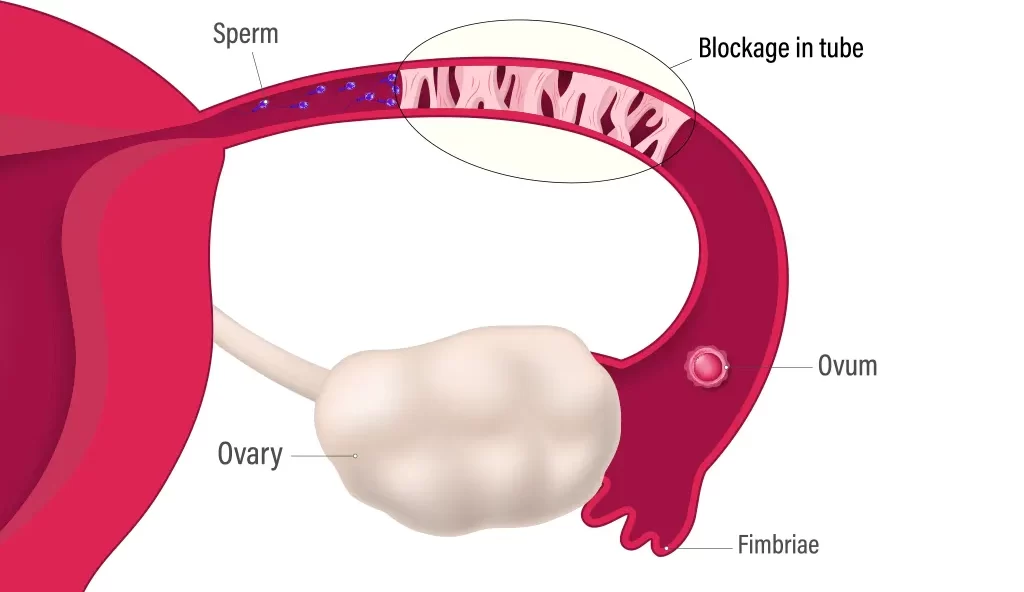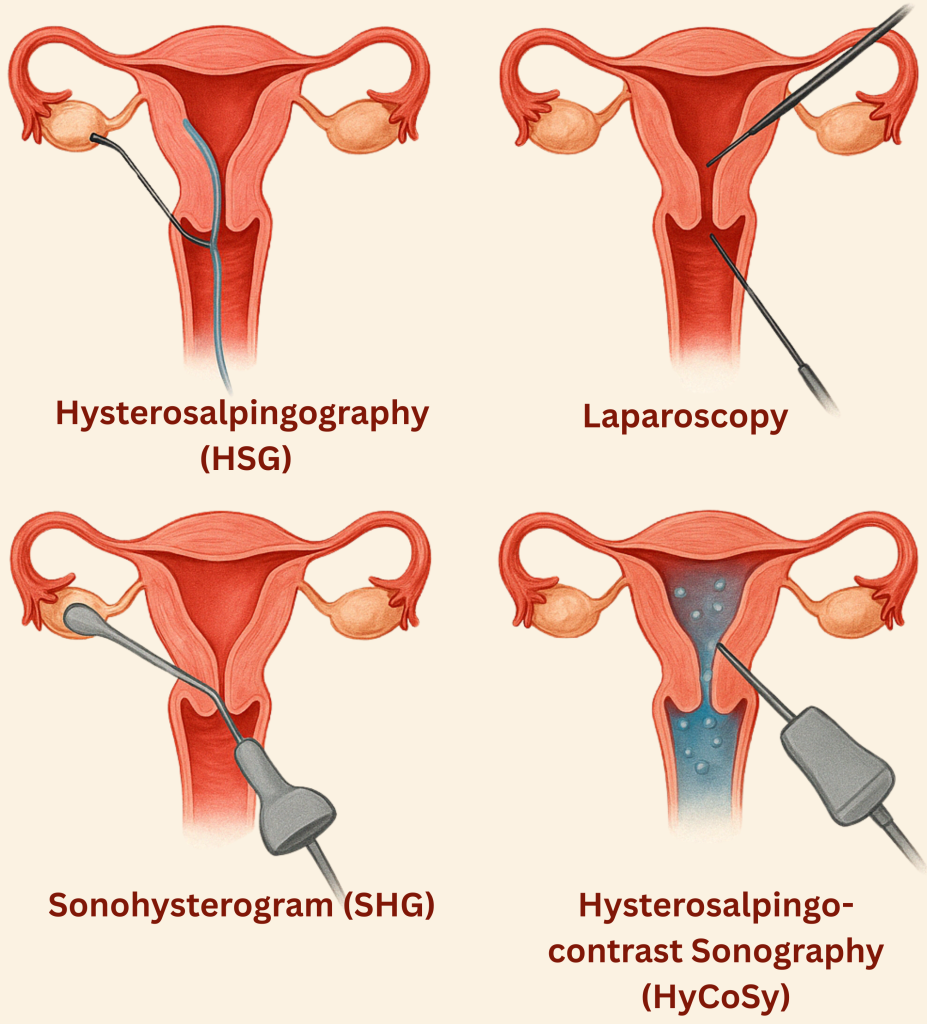Blocked Fallopian Tubes: IVF, Diagnosis & Treatment Guide
Infertility affects many couples worldwide and blocked fallopian tubes are one of the common causes of female infertility. If you are struggling with this condition, understanding its diagnosis, available treatments and options like IVF (In Vitro Fertilization) can provide hope. At Lakshmi Fertility Centre, Karaikudi, we offer comprehensive care and advanced infertility treatments tailored to each patient’s needs. In this article, we’ll explore blocked fallopian tubes, how they are diagnosed, treatment options and the role of IVF in overcoming infertility.

What Are Blocked Fallopian Tubes?
The fallopian tubes play a crucial role in reproduction. They connect the ovaries to the uterus and are responsible for transporting the egg released during ovulation to the uterus for fertilization. When the fallopian tubes become blocked or damaged, it can prevent sperm from reaching the egg or interfere with the fertilized egg’s ability to travel to the uterus.
Blocked fallopian tubes are a common cause of infertility and they can occur for a variety of reasons, such as:
- Pelvic inflammatory disease (PID)
- Endometriosis
- Previous surgeries in the pelvic area
- Ectopic pregnancy
- Pelvic adhesions or scar tissue
If you’re dealing with blocked fallopian tubes, it’s essential to understand the treatment options available and how advanced fertility care can help you.
Diagnosis of Blocked Fallopian Tubes

To diagnose blocked fallopian tubes, doctors use several methods. The primary diagnostic tests include:
1. Hysterosalpingography (HSG)
This X-ray test involves injecting dye into the uterus to visualize the fallopian tubes. If the dye doesn’t pass through, it indicates a blockage. You can learn more about the HSG procedure from the American College of Obstetricians and Gynecologists (ACOG).
2. Laparoscopy
Laparoscopy is a minimally invasive procedure used to look directly at the reproductive organs. It allows the doctor to assess the condition of the fallopian tubes and surrounding tissues. If blockages are present, they can be treated during the same procedure.
3. Sonohysterogram (SHG)
A saline solution is injected into the uterus while an ultrasound is performed to examine the condition of the fallopian tubes and the uterus. This test can help detect certain types of blockages, although HSG is generally considered more effective.
4. Hysterosalpingo-contrast Sonography (HyCoSy)
This ultrasound technique uses a contrast agent to identify blockages in the fallopian tubes. It’s a newer, non-invasive method that’s becoming more popular.
Treatment Options for Blocked Fallopian Tubes
There are several treatment options available for women with blocked fallopian tubes. The best choice depends on the severity of the blockage, whether it’s on one or both sides and your overall fertility health. Here are the primary treatments:
1. Surgery to Unblock Fallopian Tubes
In some cases, surgery may be recommended to remove the blockage or repair the fallopian tubes. This could include procedures like:
- Tubal Cannulation: A small tube is used to clear blockages in the fallopian tubes.
- Tubal Recanalization: This procedure aims to reopen blocked tubes using a catheter and special instruments.
- Tubal Ligation Reversal: If the fallopian tubes were previously tied (as part of sterilization), surgery can be performed to reconnect them.
While surgical options can be effective, they are not always successful, especially if the tubes are severely damaged. Surgery is often more effective when only one tube is blocked.
2. Intrauterine Insemination (IUI)
IUI is useful when one tube is open or after minor surgical repair. It involves placing sperm directly into the uterus, bypassing natural barriers. According to the Cleveland Clinic, this method can improve conception chances, especially when combined with ovulation-stimulating medications.
3. In Vitro Fertilization (IVF)
IVF bypasses the fallopian tubes completely by fertilizing the egg outside the body and transferring the embryo directly into the uterus. As noted by the American Society for Reproductive Medicine (ASRM), IVF is particularly effective for women with both tubes blocked.
At Lakshmi Fertility Centre, our experienced team has helped many couples conceive successfully through IVF. Factors like age, egg quality and overall health influence success rates, but modern advancements have significantly improved outcomes.
The Role of IVF in Treating Blocked Fallopian Tubes
IVF is often the recommended treatment for women with both fallopian tubes blocked. Here’s how IVF works:
- Ovarian Stimulation: The patient is given hormone injections to stimulate the ovaries to produce multiple eggs.
- Egg Retrieval: The eggs are collected from the ovaries using a small needle.
- Fertilization: The eggs are fertilized in the laboratory with sperm from the male partner or a sperm donor.
- Embryo Culture: The fertilized eggs are monitored as they grow into embryos.
- Embryo Transfer: One or more healthy embryos are selected and transferred into the uterus.
Because IVF does not rely on the fallopian tubes, it is one of the most effective treatments for blocked fallopian tubes. The success rates for IVF vary, but global studies show that approximately 40-45% of women under 35 have a successful pregnancy with IVF. Success rates tend to decrease with age and other factors, such as egg quality, also play a role.
4. Intracytoplasmic Sperm Injection (ICSI)
ICSI is often used alongside IVF when there’s male infertility or poor fertilization history. It involves injecting a single sperm directly into an egg. The Cleveland Clinic notes that ICSI is particularly helpful in cases where sperm count or motility is low.
Advanced Fertility Care Options
In addition to the common treatments like IUI and IVF, there are advanced fertility care options that can further improve the chances of conception for couples facing infertility. Some of these options include:
- Egg Freezing: For women who want to preserve their fertility for future use, egg freezing allows eggs to be collected, frozen and stored for later use.
- Genetic Testing of Embryos: Preimplantation Genetic Testing (PGT) can be done on embryos created during IVF to screen for genetic disorders before they are transferred to the uterus.
- Egg and Sperm Donation: In some cases, using donated eggs or sperm can help couples achieve pregnancy, especially when there are issues with egg quality or male infertility.
At Lakshmi Fertility Centre, we offer a range of these advanced fertility treatments to ensure you receive the best possible care tailored to your unique needs.
IVF Success Rates and What to Expect
The success rates for IVF can vary widely based on several important factors, including the woman’s age, the quality of the eggs and sperm and any underlying health conditions. According to the American Society for Reproductive Medicine (ASRM), the average IVF success rate for women under 35 is around 40%, but these rates tend to decline with age, with women over 40 typically experiencing lower success rates.
Several factors influence IVF outcomes:
- Age – Younger women generally have higher success rates.
- Egg and sperm quality – Healthier reproductive cells increase the chances of fertilization and implantation.
- Underlying conditions – Issues like PCOS, endometriosis or hormonal imbalances can affect outcomes.
Fortunately, advancements in fertility care are improving IVF results. Techniques like improved embryo culture and genetic testing (PGT) help select the healthiest embryos, enhancing the likelihood of success even in older age groups. It’s always important to consult a fertility specialist who can evaluate your personal medical history and fertility profile to give a clear understanding of what you can expect from treatment.
FAQs
1. What are the signs of blocked fallopian tubes?
Common signs include pelvic pain, irregular periods or difficulty conceiving. However, many women with blocked fallopian tubes may not experience symptoms, so a medical evaluation is necessary.
2. Is IVF the only option for blocked fallopian tubes?
IVF is a highly effective treatment for blocked fallopian tubes, but depending on the severity and location of the blockage, other options like surgery or IUI may also be considered.
3. How can I improve my chances of IVF success?
Factors like maintaining a healthy weight, avoiding smoking and alcohol and following your fertility doctor’s advice can help improve your chances of success.
4. How long does the IVF process take?
The IVF process typically takes about 4-6 weeks, but this can vary depending on your specific treatment plan.
5. What are the costs of IVF?
The cost of IVF can vary depending on the clinic, location and the specific treatments required. It’s best to consult with your fertility clinic for an estimate based on your needs.
Conclusion
If you are struggling with blocked fallopian tubes and seeking infertility treatments like IVF, IUI or ICSI, Lakshmi Fertility Centre in Karaikudi offers personalized care and advanced fertility treatments to help you on your journey to parenthood. With a team of experienced specialists and a commitment to excellence, we strive to provide the best fertility care and support.
If you’re ready to take the first step toward treatment, contact us today for a consultation. Our experts will work with you to develop a treatment plan tailored to your needs and guide you through each step of the process.
